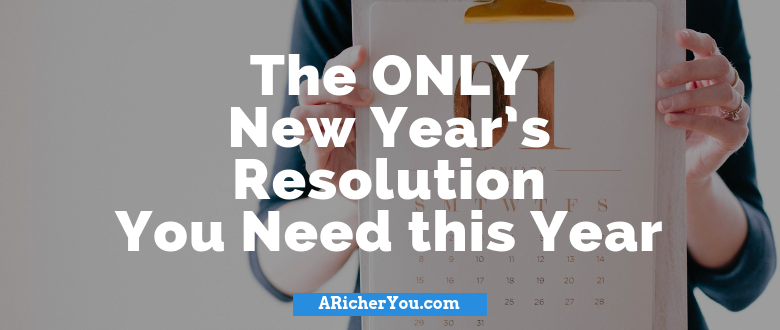For us goal-driven idealists, New Year’s Resolutions are like cocaine to an addict. Although developing the discipline to succeed is a monotonous struggle, daydreaming about who you could be 12 months from now is exhilarating!
What if I was stronger, richer, more spiritual, friendlier, happier, a better musician or a more skilled juggler? I could be… You could be… Twelve months from now we could literally be better versions of ourselves in every way.

And that’s exciting.
But there’s one problem.
Over my 30 years of life, I’ve made hundreds of resolutions – but how many have I kept? Just one.
I believe it was a decent one. I made a goal to not buy soda for a year – and I didn’t. However, my resolutions to workout three times a week, make a million bucks, write a book, or learn a new language have yet to pan out.
So my resolution success rate probably hovers around 0.5%.
This brings me to an important question:
Are New Year’s Resolutions Pointless?
There are some people (38% of Americans) who believe setting these annual goals are a waste of time, pointless, and a surefire way to guarantee failure before the year even begins.
And they’re partially right. After all, the odds are not in your favor. You will, more often than not, end up failing.
But is failure actually a bad thing?
In the 1949 film, A Connecticut Yankee in King Arthur’s Court, Bing Crosby sings a song that starts, “There’s nothing to be ashamed of, if you stub your toe on the moon…”. And I LOVE this concept.
You’ll never land higher than you aim. If you shoot for the stars and “only” make it to the moon, you’re still 238,900 miles higher than you would be otherwise.
Failure itself is never a bad thing. Failure provides us with an opportunity to grow AND ensures that we are pushing ourselves to our limits – both of which allow us to maximize our full potential.
A lack of follow through is the real issue
Most of these “anti-resolutioners” are probably not saying you should avoid failure. They’re saying that no one follows through with their resolutions in the first place. And why make resolutions if you aren’t going to follow through? To try and fail is one thing, but to never really try is a whole other issue.
And this makes a lot of sense to me. I’ve tried so many different resolutions with only one lasting longer than a few months. So, in that case, is it just a waste of time? Should I avoid resolutions all together?
Why you should keep setting resolutions
First off, people who make resolutions are 10x more likely to achieve their life goals. So, regardless of what you do, keep setting those New Year’s Resolutions! Even if you only follow your plan to exercise for the first two months of the year, you’ve still exercised for two months longer than you would have otherwise.
However, that doesn’t mean you should keep setting resolutions with no plan to actually keep them. If you can set resolutions AND keep them, then you’re getting somewhere.
So how do you do that?
How do you set yourself up to achieve your annual goals?
Why January Shouldn’t Be the End All
Both researchers and bloggers state it is nearly impossible to implement more than one habit at a time. If you try to succeed in two or more areas, your odds of success drop to close to zero. Meanwhile, if you focus on one habit at a time, your odds of success can reach 50-80%.
So, if you want to make 2019 a success, you’ve got to shrink that January list of 15 goals down to just one.
But how do you choose between exercising, writing, improving your relationships, and traveling more? They are all areas you want to focus on – do you really have to achieve just one a year?

Thankfully, no!
You can still achieve all of your goals – just don’t try to do them all in January.
Try to do everything at once and you’ll succeed at nothing. Hone in on one discipline and you’ll excel at anything.
The one resolution you should make this year
Of course, you can do whatever you want – but this is what I’m doing to ensure that my 2019 is my most successful year ever:
Focus on one new habit every month.
Rather than trying to write more, workout more, improve my relationships, and read more – all in January – I’m spreading these (and many other activities) out over the entire year!
During the month of January I’ve committed to launching a Side Hustle Boot Camp course by spending one hour a day building the content. I have a a ridiculous number of notes, ideas, and experiences to draw from — and I just need to commit to making it happen. At the end of January I’ll select my February focus and move on from there.
Although 30 days doesn’t actually make something a habit, it certainly can get you into a routine that makes long-term success easier. And, if I fail to maintain a habit that I believe is important, I can make it the goal for another month later on in the year.
By focusing on one habit at a time, and reevaluating every month, you will increase your ability to succeed in that arena, and you will develop monthly, rather than annual, evaluations to measure your progress.
How to succeed at the “one habit a month” resolution
If you would like to make 2019 a year of concrete successes, then I would recommend trying to split up your resolutions over a longer time-frame. If you want to travel more, make January the month you buy all of your plane tickets and schedule your time off. Then, make February the month you go to the gym every day to build that “vacation bod”. After all, you can do anything for 30 days.
To ensure that you achieve twelve 30 day habits in 2019, take the following steps:
- Add an appointment for the 25th of every month to your phone calendar right now. Most New Year’s Resolutions fail because we forget about them. By adding an appointment right now to your calendar, you will be reminded on a monthly basis to evaluate your progress on that goal and plan for your next month’s goal.
- Only choose habits you are passionate about. I think learning a new language would be great – but it’s not going to be a priority for the first few months of 2019. If I make it a goal for January, I’m not going to be motivated to accomplish it. However, I've wanted to build a course for years (and I do it for work every day) – so that’s a goal that I'm passionate about and have the skills to accomplish. Every month, choose something you will want to do.
- Make the goal realistic. A goal that is too big will scare you away before you even start. Don’t try to go to the gym every day if you get tired walking up a flight of stairs. Instead, focus on going for a daily walk of at least 15 minutes. If you go longer, great, but you won’t fail before you begin due to mental exhaustion. A great book on this subject is Mini Habits by Stephen Guise.
- Find accountability partners. If you can find someone to exercise with, or at least hold you accountable, you’ll be far more likely to excel. Plan a weekly conversation with this person and stick to it. How do you choose the right person? Find someone invested in your success. If you’re focusing on health or attitude, a spouse is a great choice – as they want you to be happy and healthy as much (if not more) than you do. If it’s a business or work goal, a boss, partner, or employee will eagerly hold you accountable.
- Don’t give up. Just because you miss one day, one week, or even one month doesn’t mean you should give up. Look at the activity as a daily goal. Every day you achieve it, you’ve succeeded. If one month was a bit slow, reevaluate and refocus the next month and try again!
Try something new for 30 days.
If you’re looking for more inspiration for your monthly challenges, check out this great Ted Talk by a Google employee who took on the 30 day challenge and accomplished quite a bit (including a TED Talk).
What will your 2019 look like?
The benefit of New Year’s Day is that it forces you to reevaluate where you are now, and where you want to be. That, not the resolutions, is what’s truly valuable. And by doing this on a monthly, rather than an annual basis, you can be more consistent about shaping yourself into the perfect “you”.

For me, 2018 has been awesome, and I’m excited to see what's next. But the key to future success will be building on this momentum and continually improving myself — one month at a time. What about you? How will you make 2019 the best year ever?
For the comments: What are your thoughts on New Year’s Resolutions – are you for or against? Do you think monthly goals are a better alternative, or just another way to falsely hype yourself up?
If one of your goals is to make extra money online in 2019, then keep an eye out for my soon-to-launch course, where I'll help you become a side hustle Renaissance man (or woman). I've made over $100,000 in my free time in the last five years, and I want to help you do the same. My goal is for students to earn their first $1,000 online in under a year. Subscribe below to be the first to learn about the course launch (and receive awesome bonuses available exclusively to A Richer You subscribers).
I originally published a version of this article on Money Nomad in 2015.



Oh yeah! I want to receive more money! Whether I win it or earn it..I am open to it!
I also think that calling it a NY’s resolution is useless. I am guessing that most people do not take it seriously. It’s almost a running joke. However, when you choose to fulfill life goals (or annual goals) that seems much more serious—that you commit to a real choice that is not superficial.
That’s a great point Chelle! Life goals seem to have a longer shelf life than New Year’s Resolutions.
It will be hard to find twelve things I am passionate about, in order to have one per month, but I can see how this practice would make someone a better person.
My New Year’s Resolution is to become debt free in 2019!!!!
I want to try to be more active.
Thank you guys so much for the chance!
I’m paying down debt in 2019
Great suggestion Rob. I think focussing on one thing at a time is always more effective than a scattered approach, so this makes sense. And once it’s a habit you’re more likely to stick to it.
Thanks for stopping by Marc. And I agree, focus can certainly result in a far more successful end result than trying to do multiple things at once.